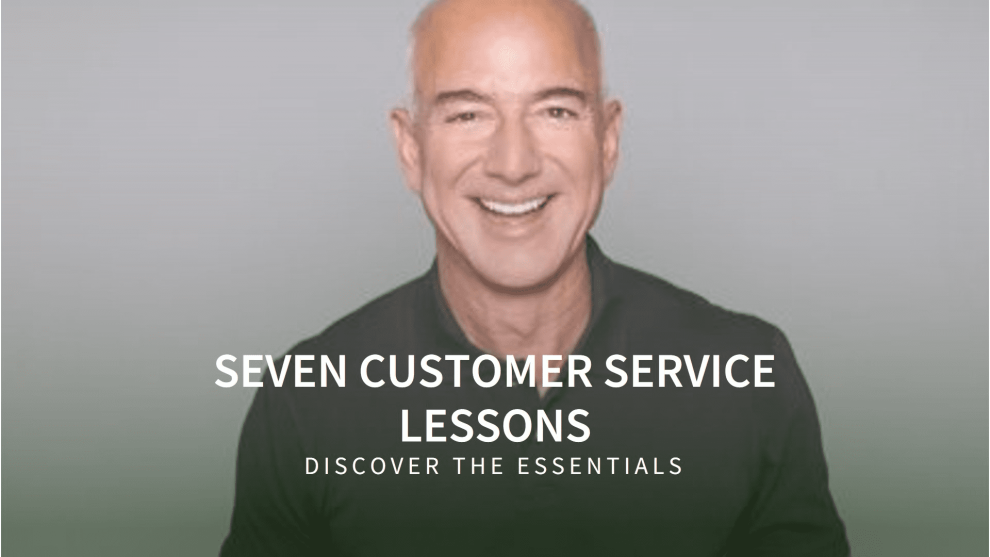Amazon’s status as a leader in customer satisfaction is no accident. The American Customer Satisfaction Index consistently ranks Amazon at the top of the e-commerce industry, and much of this success can be attributed to the visionary leadership of Jeff Bezos. Bezos’s approach to customer service has set new standards, transforming Amazon into a paragon of customer-centric excellence. Here, we explore seven critical customer service lessons from Jeff Bezos that can help businesses enhance their customer service strategies.
1. Don’t Just Listen to Your Customers, Understand Them
“Everyone has to be able to work in a call center.”
Jeff Bezos’s commitment to understanding customers goes beyond mere listening. Each year, Bezos requires that all Amazon managers, including himself, undergo two days of call-center training. This practice is designed to immerse leaders in the customer experience, ensuring they genuinely understand customer needs and challenges.
By prioritizing empathy and deep comprehension, Amazon cultivates a workforce that not only hears customer feedback but also grasps the underlying issues. This practice highlights a critical customer service lesson: true understanding leads to better problem-solving and innovation.
2. Serve the Needs of the Customer
“We’re not competitor obsessed, we’re customer obsessed. We start with what the customer needs and we work backwards.”
Bezos’s philosophy is that companies should focus on customer needs rather than competitors’ actions. The Kindle, for example, was developed based on customer desires rather than technological feasibility alone. Bezos famously responded to questions about the Kindle’s budget with, “How much do we have?”—demonstrating his unwavering focus on delivering what customers want.
Business leaders should apply this lesson by prioritizing customer needs in product development and service delivery. By focusing on how to meet and exceed customer expectations, companies can create products and services that resonate more deeply with their audience.
3. The Empty Chair: The Most Important Person in the Room
“Focusing on the customer makes a company more resilient.”
Early in Amazon’s history, Bezos introduced the concept of the “empty chair” in meetings, symbolizing the customer. This chair was a visual reminder that customer perspectives should be central to every business decision.
This practice underscores the importance of always considering the customer’s point of view. By keeping the customer metaphorically present in meetings and decision-making processes, companies can ensure that their strategies remain customer-focused and relevant.
4. Never Settle for 99%
“We’re not satisfied until it’s 100%.”
Bezos’s commitment to excellence is exemplified by Amazon’s drive to achieve 100% customer satisfaction. In December 2011, Amazon hit a 99.9% delivery rate before Christmas but aimed for perfection, illustrating Bezos’s insistence on never being complacent.
This lesson emphasizes the importance of aiming for the highest standards. Companies should strive for 100% satisfaction, continually refining their processes and services to eliminate any shortcomings and deliver exceptional customer experiences.
5. Respect Today’s Customer
“If you make customers unhappy in the physical world, they might each tell six friends. If you make customers unhappy on the Internet, they can each tell 6,000.”
Bezos understands the amplified power of today’s digital consumer. Negative experiences can quickly spread online, influencing thousands of potential customers. Therefore, it’s crucial to manage customer dissatisfaction effectively and promptly.
This lesson teaches businesses to respect and address customer concerns seriously. Developing robust strategies for handling online feedback and complaints helps maintain a positive brand image and build stronger customer relationships.
6. Strive to Create a Customer-Centric Company
“If we can arrange things in such a way that our interests are aligned with our customers, then in the long term that will work out really well for customers and it will work out really well for Amazon.”
Amazon’s success is partly due to its customer-centric culture. Bezos has ensured that every department at Amazon is data-driven and focused on enhancing the customer experience. This approach allows Amazon to make informed decisions that benefit both the customer and the company.
Businesses should aim to align their interests with those of their customers. By embedding a customer-centric approach into the company’s culture and operations, organizations can drive long-term success and customer loyalty.
7. Don’t Be Afraid to Apologize
“We will use the scar tissue from this painful mistake to help make better decisions going forward, ones that match our mission.”
In 2009, Amazon faced a significant backlash when it remotely deleted copies of books from users’ Kindles. The initial corporate apology was lackluster, but Bezos’s personal, heartfelt apology helped restore customer trust.
This incident highlights the importance of owning up to mistakes and addressing them sincerely. A genuine apology demonstrates a company’s commitment to its customers and can mitigate negative impacts, reinforcing the organization’s reputation for integrity.
Conclusion
Jeff Bezos’s customer service principles provide invaluable lessons for businesses striving to enhance their customer interactions. By deeply understanding customers, prioritizing their needs, maintaining high standards, and fostering a customer-centric culture, companies can achieve greater customer satisfaction and long-term success. Implementing these strategies can transform customer service practices and position businesses as leaders in their respective industries.
Incorporate these lessons into your own customer service strategies to create a more responsive, empathetic, and customer-focused organization. The insights from Jeff Bezos are not just theoretical; they are practical, actionable strategies that can lead to real improvements and lasting customer loyalty.
Content Courtesy: Salesforce.
For more insights on SME, Startup and Businesses, visit BharatiyaMedia.com. For editorial inquiries, email sharma.maayank@yahoo.com, and for advertisements and other enquiries, contact us at contact@entrepreneur.org.in.
Read these article also:
Exploring Chhattisgarh: The Heart of Central India
The Surge of SME and Startup IPOs on BSE and NSE: Trends, Benefits, and Challenges
How to Start an E-commerce Business: A Comprehensive Guide for Beginners
Boosting Innovation: Research & Development in Processed Food
How Government Schemes are Helping SMEs
Join BharatiyaMedia WhatsApp Channel for regular updates on SMEs, Startups and Businesses












Add Comment